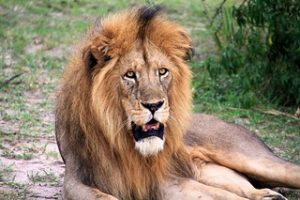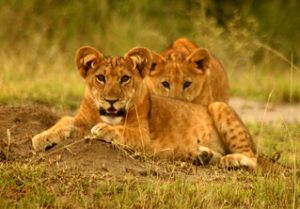Lions interesting facts and the best Places to find them in Uganda Africa
 A lion is one of the big5 animals categorized together with the Elephant, Buffalo, Leopard and the Rhino. It is the King of the Jungle and on any African Safari Vacation, Lions are the most sought after followed by the Leopard. Uganda lions stand out in the world because they have a rare habit of climbing trees. Perhaps you have heard about lions that climb trees, Tree climbing lions! They are found in Ishasha, Uganda’s Queen Elizabeth National Park and are such a marvel to behold!
A lion is one of the big5 animals categorized together with the Elephant, Buffalo, Leopard and the Rhino. It is the King of the Jungle and on any African Safari Vacation, Lions are the most sought after followed by the Leopard. Uganda lions stand out in the world because they have a rare habit of climbing trees. Perhaps you have heard about lions that climb trees, Tree climbing lions! They are found in Ishasha, Uganda’s Queen Elizabeth National Park and are such a marvel to behold!
Lions Interesting Facts
Social Habits of Lions
Generally, lions are very social animals that live, work and hunt together. They live in families called prides and every pride you will find males which can be mature or middle aged, females and the young ones. There will always be a dominant male which protects the pride and it keeps with but not in the pride. For dominance, male lions are fond of killing the young male lions/cubs and that’s why the lionesses keep them away from the pride until they reach maturity. They are so protective over the cubs whose survival largely depends on the strength of the mother. She has to endure frequent fights from the males who barely want any sight of a male cub. If another male lion, and of course a middle aged one, is to keep with the pride which has a dominant male, it can only survive fights/attacks from the king (dominant male) if it exhibits high levels of submissiveness to it.
Lions Diet/Feeding habits
Lions are carnivorous animals that feed on meat but when they starve, they can chew grass for survival. Lions are hunters and the biggest part of hunting, almost 70%, is done by the females. The females will hunt down the prey and after a kill, they will roar inviting males to come and open the food. The male opens the prey and serves itself first starting with tearing the breast though eats the liver first. Interestingly, the females and the young ones always join later.
Lions Habitat
Lions habit savanna grasslands, woodlands and dense bush. Their movement patterns are mostly determined by food or prey availability in an area. Taking an example of Queen Elizabeth National Park, lions cross the Virunga forests to Ishasha in the savannas where grazers (their prey) are in plenty. In their natural habitats, lions can live upto around 14 years and 18 while in captivity or Zoos. Queen Elizabeth National Park had its oldest lion called Ziwa that died at 15 years in 2019. Kibonge in Entebbe Zoo died at 18 years in 2018 and it remains with a record of the oldest lion that once lived in the whole of Africa.
Lion Gestation Period
 The Lion’s gestation period is 105 days after which it will give birth to about 3 babies/cubs. They usually give birth to premature babies whose survival largely depends on how many times the male mounted a female. Dr. Erick Edroma (the late), once one of Uganda’s animal behaviorists did an extensive research on lions. One of his findings was that lions can mate for 7 days. A male mounts 80 times a day and it does so every after 15 minutes. However, the number of times reduce with the days. It mounts 80 times on the first day, 70 times on the second day and goes on reducing like that until 20 or even 10 times on the last(7th) day of mating. If a male is strong to be able to mount those times, it gives high chances for the cubs to survive.
The Lion’s gestation period is 105 days after which it will give birth to about 3 babies/cubs. They usually give birth to premature babies whose survival largely depends on how many times the male mounted a female. Dr. Erick Edroma (the late), once one of Uganda’s animal behaviorists did an extensive research on lions. One of his findings was that lions can mate for 7 days. A male mounts 80 times a day and it does so every after 15 minutes. However, the number of times reduce with the days. It mounts 80 times on the first day, 70 times on the second day and goes on reducing like that until 20 or even 10 times on the last(7th) day of mating. If a male is strong to be able to mount those times, it gives high chances for the cubs to survive.
Where to find Lions in Uganda on a wildlife Safari?
In Uganda, lions can be spotted in three large national parks of Queen Elizabeth, Murchison falls and Kidepo Valley. Apart from the jungles of these parks, some lions in Uganda are protected by the Uganda Wildlife Education Centre, formally Entebbe Zoo. Tree climbing lions are exclusive to Ishasha in Queen Elizabeth National Park just like the Experiential Lion Tracking done in the north of the park. Day visits to the zoo at Entebbe can be arranged for one to see these lions. Overall, the experience of finding them active in the jungle is most desired and a life-time one, to say the least! Book any of Jungle Escape Africa’s Uganda Safaris to see the lions alongside other fascinating wildlife adventures like Gorilla trekking, Chimpanzee tracking, mountain hikes and others. Apart from the longer safaris, you can book some of these short trips to see lions:
- 3 Days Lion trekking and Queen Elizabeth Safari
- 3 Days tree climbing lions Safari
- 3 Days Queen Elizabeth Safari with Lion trekking
- 3 Days Murchison Falls Big5 tour
- Uganda Gorillas and lions safari
Threats to lions in Uganda, Africa
There is quite some pressure on the African lion population and Uganda lions are no exception. In the last 50 years, there has been continued threat to the lives of lions, most especially those in the national parks.
-
Human encroachment on their habitat
The major threat to lions is man. In Queen Elizabeth Park for example, there is great encroachment on the lions’ habitat by the communities near the park. When this happens, lions are squeezed in smaller areas where even their prey can not multiply easily hence limiting their food sources. In the process, they extend their food searches to the communities by preying on their animals like the cattle and goats. The locals retaliate by poisoning them and the latest saddest incidence was in 2018 where a pride of over 10 lions was poisoned by the pastoralists. In some cases lions are trapped by snares planted by the poachers and end up dying incase the wildlife response team fails to reach out on time or even get to know.
-
Natural factors
Man alone shouldn’t be castigated for threats to the lions’ populations in Uganda when the natural factors too, are at play.
- Lions are hunters naturally and much as they are the jungle kings, winning over their prey is not a guarantee. Some animals like the larger ones – buffaloes and elephants aggressively hit back at them and in the process they may lose their lives.
- Lion cubs are eaten by the hyenas and vultures. when lions take up longer hunting sprees, their cubs are left with no protection and hence a big exposure to the hyenas and vultures. Also lions are not very clever animals, they always forget where they left their cubs especially when the chase for the prey is a long one. The cubs end up dying of starvation at times. Again their dens are holes dug by other animals and with in them, are the aggressive ants to whose bites the cubs rarely survive.
The threatening situation to lions in Uganda is not any different from those in other parts of Africa. Alot has to be done to ensure that lions’ population doesn’t reduce further to necessitate their declaration as ‘Endangered’. This will then imply a very narrow thread between their survival and extinction. In Uganda, the Lion Tracking and Research Project by the Uganda Carnivore Program was established to avert any possible threat to the lions’ population and their habitat.
Safaris to see Lions in Uganda, East Africa
Best of Kenya and Uganda Safari
15 Days Jungle Escape Safaris Uganda
Kenya, Uganda and Tanzania Safari Combo
Uganda, Kenya and Rwanda Safari Vacation